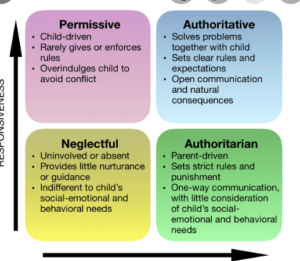Why Parenting Styles Matter When Raising Children
Understanding parenting styles and their influence on raising kids is of paramount importance. Undoubtedly, it is a very complex phenomenon to conclude the cause-effect link in the process of parenting. Progressive psychologists have long been studying parental behaviors and their effects on children.
Environment plays a very important role but not every person develops the same personality in the same environment. Children raised in the same environment can grow different personalities.
Despite this challenging situation, psychologists have speculated on the association between parenting styles and their effects on children. These effects appear evidently in adult behaviors.
So, it is our utmost and prior duty to educate ourselves about the true knowledge about parenting. But we must do it at the very early stage so that we can avoid the quagmire of spoiling the personality of our children.
Our child is the result of our behavioral patterns so what is important, is to work on ourselves. To achieve this objective, we need to find a mentor whom we can rely upon; from whom we can receive reliable knowledge; learn the highest skills to achieve the purpose.
We should make a careful choice of parenting style because it leaves a strong impact on the developmental process of our children from cradle to grave.
Diana Baumrind
A renowned developmental Diana Baumrind has explicated 4 styles that parents customarily use to train their children. A developmental psychologist at the University of California at Berkeley, in the 1960s. Maccoby and Martin also contributed by refining the model in the 1980s.
Baumrind noticed that preschoolers exhibited distinctly different types of behavior. Each type of behavior was highly correlated to a specific kind of parenting.
Baumrind’s theory is that there is a close relationship between the type of parenting style and children’s behavior. Different styles of parenting can lead to different child development and child outcomes.
Based on the extensive observation, interviews, and analyses, Baumrind initially identified these three parenting styles:
Authoritative parenting
Authoritarian parenting
Permissive parenting

The Baumrind parenting styles are United States-centric. It is surely ambiguous how can they help parents across cultures. Each parenting style varies in at least four areas: discipline style, communication, nurturance, and expectations.
https://www.brighthorizons.com/family-resources/
Here is an overview of these parenting styles. This discussion will lead us to understand the difference between the four parenting styles and analyze ours. This will resultantly help us to remove our flaws.
What is the attitude of different parents towards their kids?
Do they let them be independent in their activities; or encourage their inquiries?
Do they demand strict compliance? or behave very softly?
The four types of parenting styles are:
Authoritative
Authoritative parenting ensures high demandingness and high responsiveness. This is the most optimal style of parenting in which parents train their kids to be self-responsible. They let them realize their importance. The authoritative parenting style is a sensible methodology. It can produce self-sufficient children by raising their spirits. Their emotional health is superb. They are comparatively more refined and gregarious.
The parents of the authoritative approach have transparent prospects. They communicate effectively with their children. They nurture in a more responsible manner and the outcome is quite positive. The children are self-reliant and unruffled. Resultantly, they can contribute the best possible to society. So the effects of parenting are not limited to only the personal grooming of a child but also contribute to social development.
Authoritarian (or Disciplinarian)
This specific style certifies high demandingness but low responsiveness. Parents adopt Machiavellian behavior in nurturing their kids by implementing this style.
Their attitude to discipline their children is bossy. Parents like complete acquiescence on behalf of children. Strict and commanding deportment which results in awarding punishment is the key feature of this very style. They adopt an aggressive dispositions. It is quite possible that they most often develop psychological issues like self-respect, downheartedness, and angst.
Here communication is little. Parents set high hopes but they don’t provide a congenial environment to work for their dreams. Discipline is stern; punishment is uncompromising. No doubt children are obedient but they are not happy. Their relationship with their parents is weak. There is a gap. And this is very tragically a greater cost.
Permissive (or Indulgent)
There is high demandingness and low responsiveness. Parents implementing this style do not use strict discipline. Emotions govern and discipline is non-extant. There are no problems in behavior patterns as well as emotional problems. Communication is greater but guidance is not present. Students resolve their matters by themselves. But the outcome of this style of nurturing is despondent. Because children experience low self-regulation.
In Permissive parenting children are not developed to perform brilliantly. They are unhappy because they are unable to cope with the challenges successfully. Their academic skills also suffer and consequently, results are poor. There is a lack of proper guidance. There are low expectations. Excessive freedom and over-friendliness mutilate the whole thing.
Neglectful (or Uninvolved)
The uninvolved parenting style was added by Maccoby and Martin in 1983. This style confirms low demandingness and low responsiveness.
Neglectful parents are passionate but they also don’t implement rules and regulations. This is awfully the worst form of parenting. Parents don’t support their children in any way. Rather they remain quite indifferent. And the result is calamitous. Children are poor not only in their social behavioral patterns. They don’t develop high self-esteem.
They are unable to accept the tests of time and destiny. Communication is non-existent. Guidance is absent. Some parents deliberately adopt this style. Others don’t take even a little interest in parenting. There is again unjustifiable liberty to do anything they like to do. Parents don’t support their children in any way. Rather they remain quite indifferent. And likewise, they don’t associate high hopes with their children eventually the result is chaos.
Most juvenile offenders have uninvolved parents (Steinberg 2001).
Parenting styles are categorized based on two dimensions of parenting behavior and styles:
Demandingness refers to the extent to which parents control their child’s behavior or demand their maturity.
- Demandingness refers to “the claims parents make on children to become integrated into the family whole, by their maturity demands, supervision, disciplinary efforts and willingness to confront the child who disobeys” (Baumrind 1991).
Responsiveness refers to the degree to which parents are accepting and sensitive to their children’s emotional and developmental needs.
- Responsiveness is “the extent to which parents intentionally foster individuality, self-regulation, and self-assertion by being attuned, supportive, and acquiescent to children’s special needs and demands” (Baumrind 1991).
Both the above-mentioned qualities are required for the best outcome. And only authoritative parenting contains both characteristics. Authoritative parenting produces self-governing, responsible, well-organized people. This style is mostly associated with successful kids.
The Remunerations of Authoritative Parenting style
They possess high self-esteem.
More compliance comes from them.
They cherish their discerning ability due to the trust parents have in them after making them understand the logic behind the imposed disciplinary measures.
They develop an acute sense of right or wrong. Which is the result of their parents’ sensible approach to training them.
A unified approach to parenting rather than a fragmented one can be more impactful. Both parents can implement different approaches. As the father can utilize a permissive approach and the mother can be authoritative in her style. This amalgam can produce the best results. But parents must be very careful in following this pattern of blending to avoid unfavorable outcomes.
Parents can do this effectively by acquiring the learning process.
Another component that can impact the outcome is the distinction between parenting style and parenting practice.
Parenting style is the emotional climate and control in which parents raise their children.
Parenting practices are specific actions that parents employ in their parenting.
Do parenting styles affect a child’s behavior?
We cannot deny the effect of parenting styles on the behavioral patterns of children.
But “Peer pressure” can abate the constructive effects of the authoritative parenting style which we consider as best.
Child’s disposition or persona?
No doubt parenting style is important but there can also be other significant factors. These factors include the child’s behavior pattern, cultural and social environment, and discerning of the parent’s behavior. In fact, features of the personalities of parents and the resultant actions and reactions are very powerful because these structures form the way how we respond to our children. Hereditary traits, prenatal situations, and disposition play a preponderant role in child development.
Extensions of Baumrind’s research-based parenting styles
Helicopter parenting
Tiger parenting
Free-range parenting
Mostly we use a combination of different parenting styles in raising children. Every child’s need is different. We cannot apply the same to all. We must keep in view the peculiar needs of a peculiar child. The parenting styles in fact provide us with a variety. Idyllically, parents can change their parenting style based on the specific requirements of their children.
Factors affecting Child’s developmental process
-
Healthy Emotional Bonding
Research shows us that the quality of the relationship between parent and child has a massive influence on brain development—the actual design of children’s brains is influenced by parenting. The academic success of children fundamentally depends upon the healthy emotional bond between parents and the children.
-
Disposition
Every soul on this planet possesses individualistic traits. He has a unique approach. Genetics plays a greater part and so does their environment. Everyone responds differently to different situations. There might be temperamental differences between parents and children. It’s a matter of great concern and deep insight into human psychology in general and child psychology in particular. We should manage our expectations according to the peculiar personality of every child respecting every individual equally. So that we can achieve the desired aims and objectives for the well-being of our children. Greater goals of parenting.
The Baumrind nurturing approaches serve just as a general framework. Out of the actual circumstances of our genitival examples and social environment, we can create our own style.
As a result, we may create a “goodness of fit” that emphasizes solid ties, clear communication, and successful principles and direction.
The goal of this parenting series is to help parents create men and women who will have high moral standards, mental fortitude, and a feeling of responsible independence. These attributes include righteousness, honesty, courage, compassion, creativity, and faith.
Further read: https://ethicsedu.com/parenting-challenges-of-the-21st-century/


I have been absent for some time, but now I remember why I used to love this website. Thanks, I will try and check back more frequently. How frequently you update your site?
I have not checked in here for some time because I thought it was getting boring, but the last several posts are great quality so I guess I will add you back to my daily bloglist. You deserve it my friend 🙂
Thank-you very much for your kind words.
congratulations on such a well written post
Thank you!
Top site ,.. amazaing post ! Just keep the work on !
Thank-you Gal! Your suggestions will be valued!
you will have a fantastic blog here! would you prefer to make some invite posts on my weblog?
Sure, I would like it! let’s proceed further!
Sure, I will. Let’s proceed further!
As a Newbie, I am always searching online for articles that can be of assistance to me. Thank you